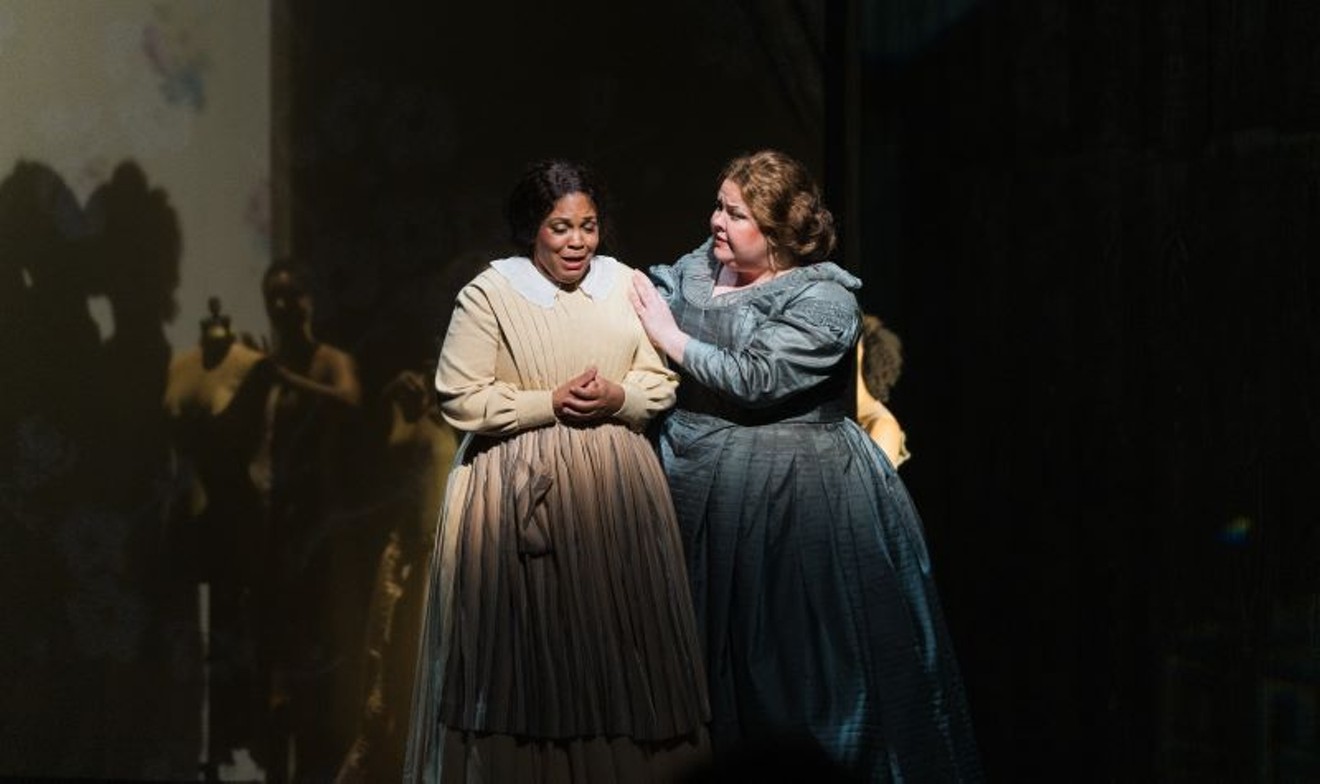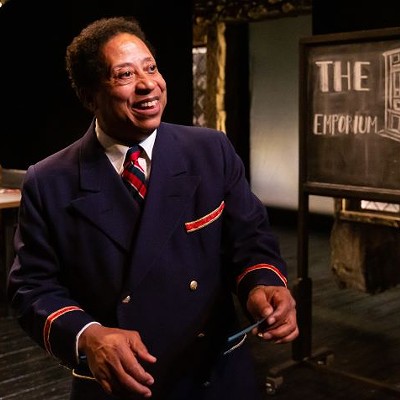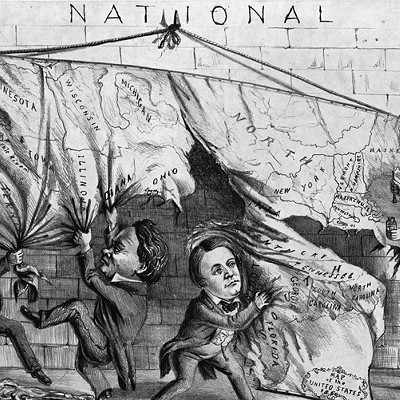Support Us
Houston's independent source of
local news and culture
account
- Welcome,
Insider - Login
- My Account
- My Newsletters
- Contribute
- Contact Us
- Sign out

Janai Brugger and Jamie Barton in Intelligence at Houston Grand Opera.
Photo by Michael Bishop, Courtesy of Houston Grand Opera
[
{
"name": "Related Stories / Support Us Combo",
"component": "11591218",
"insertPoint": "4",
"requiredCountToDisplay": "4"
},{
"name": "Air - Billboard - Inline Content",
"component": "11591214",
"insertPoint": "2/3",
"requiredCountToDisplay": "7"
},{
"name": "R1 - Beta - Mobile Only",
"component": "12287027",
"insertPoint": "8",
"requiredCountToDisplay": "8"
},{
"name": "Air - MediumRectangle - Inline Content - Mobile Display Size 2",
"component": "11591215",
"insertPoint": "12",
"requiredCountToDisplay": "12"
},{
"name": "Air - MediumRectangle - Inline Content - Mobile Display Size 2",
"component": "11591215",
"insertPoint": "4th",
"startingPoint": "16",
"requiredCountToDisplay": "12"
}
]
There are some operas that knock your socks off: Verdi's Otello, Strauss' Salome, Puccini's Tosca, Wagner's Die Walküre, Poulenc's Dialogues of the Carmelites, Berg's Bluebeard's Castle, Adams' Nixon in China. Most others are enjoyable in their music, performance, or visual flair. But sometimes, more often than not, especially in modern operas, they just sit there, waiting to catch fire.
Intelligence is a world premiere from Houston Grand Opera – its 75th, an impressive feat by anyone's standards – and it arrives with superlative pedigree. It is composed by perhaps America's most acclaimed contemporary composer, Jake Heggie, responsible for Dead Man Walking, Moby Dick, Three Decembers, Great Scott, It's a Wonderful Life, and countless art songs, choral works, and orchestral compositions. If an opera company wants to commission a new work, he's probably the first one to get the call. This new opera smolders, blazes intermittently, but doesn't produce much heat.
Wealthy spinster Elizabeth Van Lew (mezzo Jamie Barton) is a northern sympathizer. Upon her father's death she has freed most of her slaves and helps Union soldiers and escaped slaves flee north. She has hatched a new plan with her devoted household slave Mary Jane (soprano Janai Brugger). Mary Jane will work in the house of Confederate President Jefferson Davis and spy for the Union.
Mary Jane is unique in that she can read and write, schooled up north when she was a young girl. Though master and slave, the women share a curious bond. Mary Jane though is haunted by mysterious Lucinda (mezzo J'nai Bridges) who knows all about her and gently prods her to “sew more into her story.” Mary Jane says she has “more to learn” about herself. She sings a plaintive aria about not knowing “where I come from or where I'll go.”
Arousing suspicions in her sister-in-law Callie (soprano Caitlin Lynch) and Home Guard Travis (baritone Michael Mayes as the Simon Legree stand-in), their plan works exceedingly well the first day on the job. Mary Jane finds maps and troop movements and secretly sends word to Elizabeth. She does this under the not-so-watchful eye of Davis' butler Henry (bass-baritone Nicholas Newton), who fancies this new hire in the house. Later, when about to be found out, Mary Jane sets the presidential home on fire, spying Lucinda inside. End of Act I.
Act II is more of the same with the burying of Elizabeth's secret journal, Henry's persistent come-ons, Callie's sudden conversion to forget everything she knows about her family, Mary Jane's husband Wilson (tenor Joshua Blue) who's in on the plot yet mistakenly believes Mary Jane is Henry's paramour, an attempted murder, an actual murder, and then...
...the final shocking reveal about Mary Jane and Elizabeth, and Mary Jane and her mother. The secrets recall Chinatown and Sophie's Choice. But you will have already guessed that. Phantoms and magic realism butt heads in Sheer's rather awkward libretto that veers between moon/June rhymes or an attempt to shoehorn words into Heggie's spiky melodic lines.
Certainly this work is proficient, lovingly orchestrated and wondrously sung, and hangs its story upon an intriguing, true-life story that has been buried since the Civil War and cries out to be unearthed. Heggie and his collaborators have done that job with professionalism, but not urgency. Long-time Heggie librettist Gene Scheer has filled in the lacunae that kept this tale hidden for so long, and Urban Bush Women founder Jawole Willa Jo Zollar has added distinctive Afro-centric movement to the choreography.
However, her seven-women troupe is more impressive than her rudimentary direction that has characters simply walking off stage when no longer needed. The true flow happens when the framework of the set, designed by Mimi Lien, rotates to reveal a house, a large oak tree, or a slave auction. Wendall K. Harrington and Rasean Davonté-Johnson's etching-like projections provide the necessary depth and sense of place.
None of this stagecraft is novel or innovative. The score is ur-Heggie, propulsive, jagged and taut, prickly and expressive. There's a lot of blues to be heard in the underpinning, befitting the location of Richmond, Virginia, but certainly not this specific era. Echoes of '30s Gershwin swirl underneath. That's not a bad thing, but maybe not here. Sweetness comes with the music for secondary leads Lynch, Newton, and Blue (as Callie, Henry, and Wilson.) Callie's remembrances of times past and her fervent desire to return to them when the war is over is delicately traced, while Wilson's mistaken infidelity from Mary Jane spurs an ardent aria.
But the surprising, and best, music erupts in Act II after Mary Jane questions Elizabeth about her mother. As if in a trance, Mary Jane in Civil War mufti is surrounded by the undulating Urban Bush Women in Clair Hummel's stunning African ceremonial garb of beads, shells, and pompoms. (Carlos J. Soto designed the others.) Radiant color suddenly bursts forth from all that sepia. The exuberant dance is the best piece of the night, and Heggie lets loose with an all-percussion score of rhythmic drums, tambourine, and cymbal. The projections pulsate like an acid trip. The piece slaps awake the sleepy audience. For pure sound and dramatic impact, it's amazingly unique. If this score ever gets recorded, this throbbing number will be the hit tune.
As the historical record is scant indeed, the book is bumpy and reads untrue. Events happen too fast or not fast enough. Elizabeth seems too modern, while the spy plot gets dropped entirely to make room for Mary Jane's personal revelations at the finale.
Throughout, though, the singing is wonderful, with Barton, Brugger, Bridges, and Lynch sharing the spotlight. Heggie's specialty is writing for the female voice, and he doesn't disappoint. They don't disappoint him, either, allowing his astringent melodies to sweep and soar. They sweeten him. Maestro Kwamé Ryan in his HGO debut conducts the dense score with majesty and telling detail.
As a world premiere that was recently profiled in the New York Times, the press was out in full bloom, and the aisles were clogged before the show by well-wishers air-kissing and hugging Heggie, et al. It was a gala time. If only the opera had risen to the occasion.
Performances continue through November 3 at 2 p.m. Sunday, October 22; 7:30 p.m. Saturday, October 28; 7:30 p.m. Wednesday, November 1; 7:30 p.m. Friday, November 3. Wortham Center, 501 Texas. For more information, call 713-228-6737 or visit houstongrandopera.org. $25-$210.
KEEP THE HOUSTON PRESS FREE...
Since we started the Houston Press, it has been defined as the free, independent voice of Houston, and we'd like to keep it that way. With local media under siege, it's more important than ever for us to rally support behind funding our local journalism. You can help by participating in our "I Support" program, allowing us to keep offering readers access to our incisive coverage of local news, food and culture with no paywalls.
D.L. Groover has contributed to countless reputable publications including the Houston Press since 2003. His theater criticism has earned him a national award from the Association of Alternative Newsmedia (AAN) as well as three statewide Lone Star Press Awards for the same. He's co-author of the irreverent appreciation, Skeletons from the Opera Closet (St. Martin's Press), now in its fourth printing.
Contact:
D. L. Groover
Trending Arts & Culture
- Best Bets: No-No Boy, Little Shop of Horrors and Othello: The Remix
- The 10 Best And Most Controversial Hustler Magazine Covers Ever (NSFW)
- Provocative Comic Daniel Sloss Stands Up For The Right to Offend
-
Sponsored Content From: [%sponsoredBy%]
[%title%]

Don't Miss Out
SIGN UP for the latest
arts & culture
news, free stuff and more!
Become a member to support the independent voice of Houston
and help keep the future of the Houston Press FREE
Use of this website constitutes acceptance of our
terms of use,
our cookies policy, and our
privacy policy
The Houston Press may earn a portion of sales from products & services purchased through links on our site from our
affiliate partners.
©2024
Houston Press, LP. All rights reserved.






